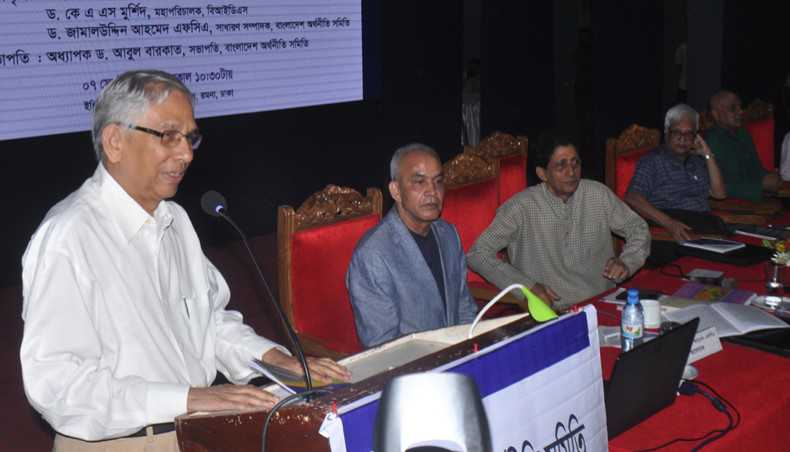Income inequality near danger mark: experts

Image collected
Speakers at an interactive seminar on Saturday unanimously admitted that the country’s income inequality was near the danger mark but differed on how to get out of this situation.
They criticised the government for highlighting the per capita income and high growth in gross domestic product too much and suppressing income inequality hovering at 0.48 in Gini coefficient to show prosperity at the seminar titled ‘Growing Income Inequality in Bangladesh: Way Out’.
Gini coefficient, widely used to measure a country’s income distribution, was just .02 points away from the danger level of .05 that signals a probable onset of widespread social unrest, said former Chittagong University economics teacher Professor Mainul Islam while presenting the key note speech at the seminar organised by the Bangladesh Economic Association at the city’s Institution of Engineers Bangladesh.
Professor Mainul narrated how the successive governments became alienated from the spirit of the country’s War of Independence because of wrong economic policies that helped ‘crony capitalism’ growing.
He pointed out that the banking sector was exploited by the loan defaulters and businessmen while corruption by politicians and bureaucrats was increasing black money.
He also mentioned that the crony capitalists were smuggling out money as the number of Bangladeshis in the Malaysian second home programme was very high.
Besides, the country’s rich and ultra-rich population was expanding due to the unequal distribution of high economic growth for the last two decades, thanks to farmers and expatriate workers, he said
He noted that the presence of businessmen in the current parliament was 62 per cent showing that ‘politics is a lucrative business’.
Mainul recommended 16 points including private sector participation in power, gas and water sectors, reform in agriculture, land and banking sectors, checking corruption, ensuring free and fair polls and free speech, preventing commercialisation of education and health sectors.
But former Bangladesh Bank governor Mohammad Farashuddin, seminar’s chief guest, opposed Mainul’s key recommendation saying that the government made a deadly ‘mistake’ by allowing private groups in the crucial power sector.
These private groups would turn into ‘foes’ in future although they are now ‘friends’ to the government, he said.
It is reported that a total of 120 power plants, at least 80 of them private, set up since 2009, have 17,840 megawatt power generation capacity against the demand for 9,000 mw during the summer leading many private sector power plants to sit idle.
The state-owned Power Development Board had to pay more than Tk 8,000 crore, out of its Tk 21,000 crore annual spending in 2018-19, to the idle power plants of the private sector as capacity payment under a legal provision, enacted in 2010 and extended thrice up to 2021.
Farashuddin sarcastically said that people did not want to pay tax as they knew that their money would be spent on making costliest power plants and roads on earth.
Besides, highlighting per capita income as prosperity became obsolete as it meant nothing for equal distribution.
BEA president Abul Barakat in his concluding address slammed finance minister AHM Msustafa Kamal for stating that Bangladesh GDP on current price was the highest in the world.
‘What will we do with this growth if it is not distributed equally?’ he asked.
Barakat also opposed Mainul’s view by saying that the government should be powerful so that the so-called ‘crony capitalists’ could not make it a puppet.
Farashuddin also doubted proposed land reform saying that the experience in West Bengal was not good for the reformists.
He said that the government should get rid of nepotism, partisan politics and middlemen’s domination for equitable income distribution.
He also suggested stopping World Bank-prescribed term loans given by commercial banks to check the rot in the banking sector.
Among others, Bangladesh Institute of Development Studies director general Khan Ahmed Sayeed Murshid, BEA general secretary Jamal Uddin and DU economics chair Shafique uz Zaman also took part in the discussion.
Murshid said that since the country accepted free-market economy good governance should be established to ensure the tickle-down effects of the country’s high growth.
Shafique said that export diversity and reducing dependency on the apparel sector were a must for checking income inequality.
Source: http://www.newagebd.net
Tags :
Previous Story
- Mergers and Acquisitions: A Possibility in Bangladesh
- Protecting our female migrant workforce
- No crisp getting by defaulters until Oct 20:...
- Dhaka stocks return to negative zone
- Sir Fazle Hasan Abed retires from BRAC Bank...
- Bangladesh Bank heist case continuing in the US...
- 'BB round soon for executing single-digit financing costs'
- Stocks rebound on Bangladesh Bank move to ease...